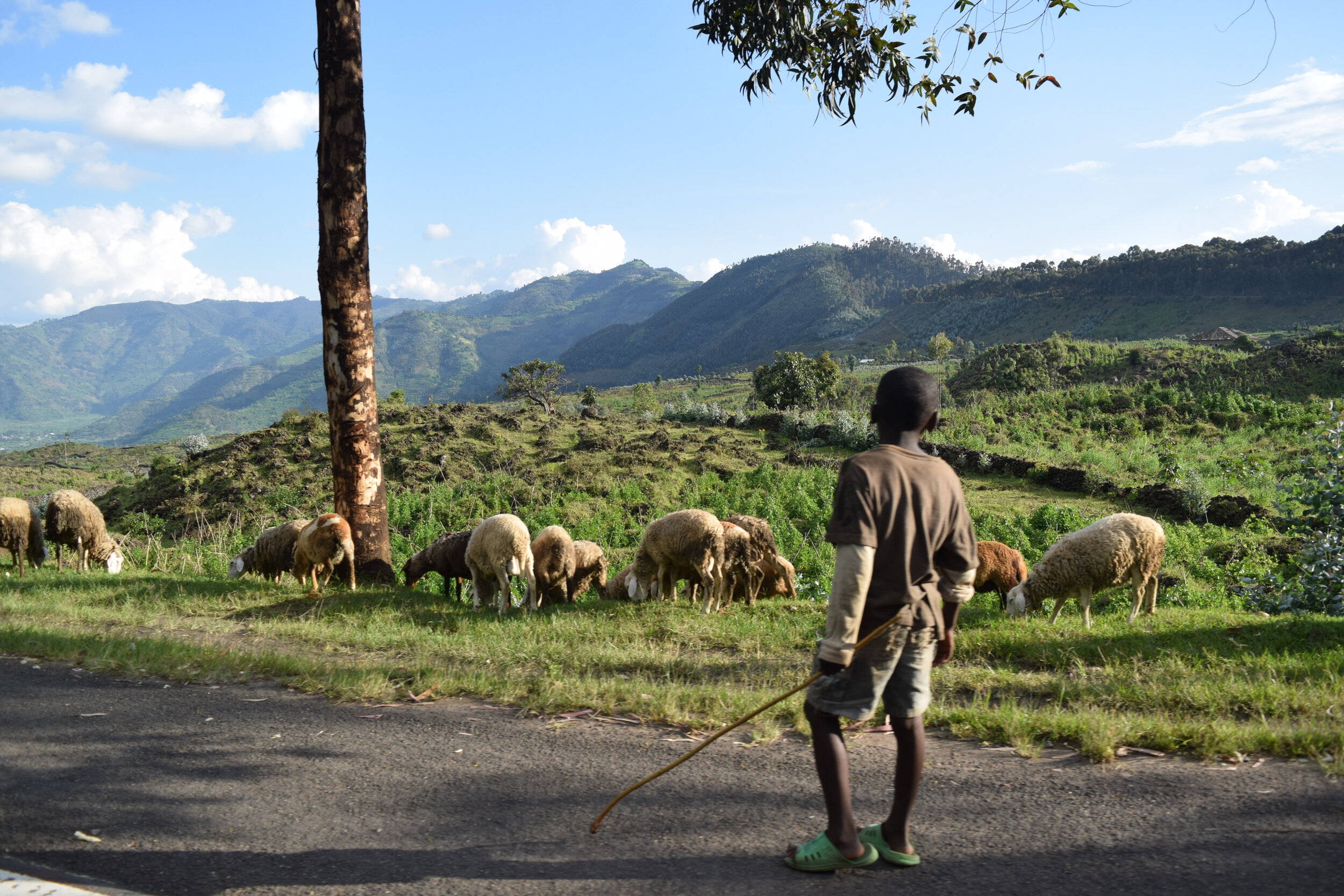This post was written by Rob Mihelic on May 27, 2018. Rob was working on his Masters in Animal Science when he spent the summer with us to improve brooding and heating efficiency. His research project reduced farmers’ charcoal usage, our most cost-effective fuel source for keeping chicks warm in the first 14 days, by 33%—a live production cost savings of around 5%.
Rob Mihelic (left) with our Lead Broiler Technician Alon Gumisiriza (right) visiting Tworore Inkoko Twunguke farmers in the Gataraga sector of Musanze, Rwanda.
Started driving this week. The roads in Rwanda are nothing like the vehicle filled roads of America. Rwanda has mostly pedestrian traffic, bicycles, and motorcycles. The few automobiles on the road are old and about 50% of the time on collision course with your car. Dodging fallen potato couriers and motorcycle taxis is more common than not. Despite all of the driving differences, it’s actually been really easy getting used to! Yesterday, Friday 5/25/18 I went with one of the techs to Gataraga, a small village near the border of the Congo where ten of our farmers live. The drive to this village is spectacular. It’s easy to see why this area is called the land of 1,000 hills.
While the only virgin forest left is in the national parks, the drive North West is a lush green landscape filled with small agricultural plots and breathtaking waterfalls. Parts of the drive where the road was dug out from the side of a mountain reminded me of driving through the Smokey Mountains. The winding road was beautiful, yet dangerous. A flipped truck was a reminder of the perils of this rural road.
When we would admire the view Alon, the tech, was able to pick out the chicken coops we helped build in the distance. He is able to tell us everything about them: their names, number of children, and how their chicken business is doing. It’s evident that he cares greatly for these farmers. After half an hour on dug out dirt roads Alon told me to pull over, we were here. When children and adults from the maize and sorghum fields swarmed the car Alon said it was OK to get out and talk/play with the kids while he used the back seat of the car like on office to meet with farmers. Everyone was excited because it was pay day!
The average monthly income for these farmers is $30-$40 a month, but through the Tworore Inkoko Twunguke (TI) project which has given them the opportunity to start a poultry business all of the farmers in Gataraga were able to double or triple their income this month! They spend the majority of their new found fortune on three things:
education for their children
new business ventures, like buying a cow and
household improvements.
All great expenses when considering that just a few months before TI training they said they would buy more sugar for their coffee.
Alon (left) discussing with farmers about the tin hood to cut to radiate heat towards chicks during brooding. Results of Rob’s research.
While Alon talked with adults, I was playing with the kids. I would teach them words in English and they would teach me in Kinyarwanda, the local language. We went over words like car, road, tree, plant, head, shirt, etc. Their favorite activity was when I showed them pictures of the animals from the safari I took last week. Zebras, antelope, hippos, and giraffes, they knew them all!
There was one kid, he looked to be about 13 or 14, who’s English was elementary, but better than the rest. He said his name was Djymon. He helped the other kids learn new words and would do a little translating. Before we left I asked Djymon how old he was. He is 25. Djymon is not a kid at all, he is older than I am!
I realized he had stunted growth as a child from inadequate nutrition. It’s sad yet inspiring to see the effects of malnutrition on someone I felt like I had gotten to know. Having a name and a face to go with this ethereal crisis I’ve been working on for months made everything that the TI project does exponentially more immediate and real.
“With the COVID crisis grounding planes and keeping non-essential workers at home, ASAP will miss having interns travel from the US in 2020. The internship experience in Africa is what exposed me to the injustices of extreme poverty and inequity of food access, cultivated my heart for sub-Sahara, and brought me back to work in Rwanda full time. Our interns not only contribute to the continuous improvement of our project but also gain life-transforming perspectives. They learn the heroes’ (our farmers and team members) names and faces; they carry these stories through life as guides and reminders to do more good.”
Katie McGehee, Managing Director of ASAP



